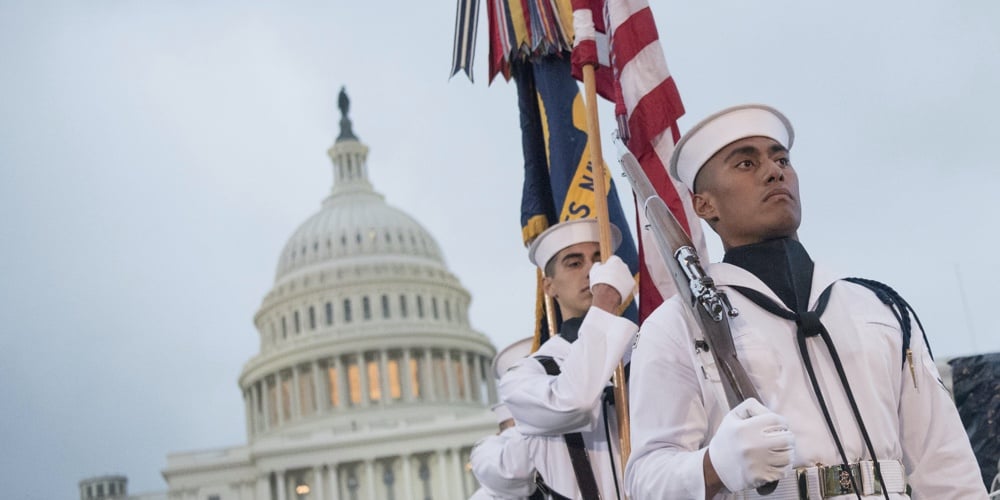Defense credit unions do not fear competition from banks, especially on base
The National Defense Authorization Act and why it matters
 Photo By Dominique A. Pineiro
The appearance of U.S. Department of Defense (DoD) visual information does not imply or constitute DoD endorsement.
Photo By Dominique A. Pineiro
The appearance of U.S. Department of Defense (DoD) visual information does not imply or constitute DoD endorsement.
This week the Senate Armed Services Committee began its markup of the FY2021 National Defense Authorization Act (NDAA). Because many incursions, restrictions, and limitations that harm credit unions are frequently slipped into the NDAA as it makes its way through the committee, it is important for defense credit unions to monitor this legislation. The Defense Credit Union Council is once again urging the committee to strike any provisions that would alter the status quo in terms of our member’s no-cost land leases and waiver of utilities and service costs for the space they occupy on military installations.
Last year, the bank lobby advocated for a proposed amendment in the FY2020 NDAA that would have required the Department of Defense (DoD) to treat “for-profit” banks as “not-for-profit” institutions so banks could obtain the same no-cost land leases as a condition for banks remaining on the installation. If DoD did not grant the banker’s wishes, then the legislation would have required DoD to charge credit unions the same as banks under the guise of equality. Yet, there was nothing in last year’s proposed amendment that would have required banks to return any of these savings to their customers.
DCUC opposed this proposed amendment for four very good reasons:
First and foremost, this proposed amendment was unfair to our military as potential savings would be put into the pocketbooks of bank shareholders versus our military, their families, and the communities in which they live. Plus, both large and community banks were already making record profits according to ongoing FDIC data.
Second, the banks like to argue about an emerging credit union “monopoly” when they currently control over 90% of the market. Yet, even this deception does not pass muster since no one is deprived of quality financial products and services when banks choose to abandon the base. Defense credit unions have successfully filled the gap for many years while banks retain their sizeable market share. Plus, it is not hard to figure out who is really complaining when an installation loses its bank. It is not the troops nor the installation commanders who sign the operating agreements.
Third, all stakeholders need to agree on a path forward that is truly in the best interests of our armed forces. For instance, this issue becomes a slippery slope as other “profit-centered” entities (e.g., DoD contractors) pursue the same benefit. I personally witnessed many DoD contractors attempt the same type of argument(s) throughout my 25-year career in the Air Force. Thus, DCUC continues to urge both the House and Senate Armed Services committees to study the full impact of any specific statutory language which the banks (and others) would seek to establish.
Finally, it is important to stress that banks already have the means to pursue the same no-cost land leases via 10 U.S.C. § 2667. The FY2001 NDAA (P.L. 106-398) gave DoD the authority to accept “in-kind consideration” for leases on military property, including “provision of such other services relating to activities that will occur on the leased property that the Secretary concerned considers appropriate.” Banks have had the ability for nearly 20 years.
In fact, I have participated in several joint meetings at the Under Secretary of Defense-level, where banks were continually advised of this provision. As a former Mission Support Commander who negotiated several public-private partnerships during my command tour, the process takes some work. However, the juice is worth the squeeze. Yet banks are either reluctant to spend the time and effort or have been misled into thinking they should be treated like “not-for-profit” institutions without any restrictions. Who are they kidding?
Fortunately, several members of Congress expressed the same concerns about this proposal to treat banks as “not-for-profit” entities, and the amendment was subsequently rejected.
Despite our strong opposition to banks seeking so-called “parity” with credit unions, the Defense Credit Union Council recognizes the important services that credit unions and banks provide to consumers on military installations. These well-regulated financial institutions offer choices in financial products and services and guard against predatory lending practices. However, DCUC is always concerned with any legislative language that benefits banks by going beyond DoD’s discretionary authority in this area; altering the status quo and thus putting defense credit unions at a disadvantage.
As we move forward, let me state this one more time: defense credit unions do not fear competition from banks, especially on base. We simply put our members first—ahead of profit. If banks want to be treated like credit unions, they need to start acting like not-for-profit credit unions. Equal treatment needs to focus on structure and ethos, not increasing the bank’s profit sustainability. Our service members deserve more!

